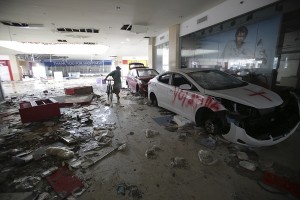‘They’re victims, not thieves’

A Filipino man walks inside a mall that has been flooded and allegedly looted after Typhoon Hayian hit Tacloban city, Leyte province, central Philippines on Wednesday, Nov. 13, 2013. AP FILE PHOTO
MANILA, Philippines—Don’t call them thieves.
The Disaster Risk Reduction Network-Philippines on Thursday cautioned the public against labeling as criminals the desperate survivors of Supertyphoon “Yolanda” who have been taking essentials and other items from department stores in the aftermath of the calamity.
“We’re not condoning the taking of others people’s properties, but let us understand the context. Let’s not call them thieves. We don’t know their context, their circumstances. They are hungry and desperate, which is why they are able to do things they would normally not do,” Zenaida Delica Willison of DRRNet said at a press briefing.
The DRRNet Philippines is a group of civil society organizations, communities and advocates that implement community-based disaster risk management.
The DRRNet said the reports of people in the devastated provinces in the Visayas taking food, clothes and cooking utensils from business establishments was not looting.
Article continues after this advertisementSurvival foraging
Article continues after this advertisement“What has been reported in the calamity areas are not massive looting but survival foraging and coping behavior,” it said.
But this does not mean there were no isolated incidents of individuals stealing unnecessary items, the DRRNet said.
“But exceptions definitely are not the norm and similar events may have well happened in normal times,” it said.
It said that in the calamity-stricken areas, what the people took were essential to their survival, even appliances.
“Even a refrigerator may serve a vital purpose to store important goods when people lose their homes,” it said.
It said the images that have come out “dominantly show very quiet and rational behavior of the ‘looters.’”
It said that instead of being portrayed as criminals, the survivors should be considered resourceful and ready to take the initiative to reestablish their lives and livelihoods while waiting for assistance.
Tragedies, such as the one spawned by Yolanda’s fury, actually bring out the best in people, the group said.
“In fact, [contrary] to widespread myths, disasters bring out the best in people, e.g. bayanihan, collaboration, mutual help, courageous behavior,” it said.
Survivors often become resourceful in trying times, DRRNet said.
“People, including the poor, are neither stupid nor silly. They are intelligent and full of resources, even in times of hardships,” it said.
The DRRNet said that saying that people turn to antisocial behavior during disasters can be harmful as it provides a reason to justify external intervention, such as the deployment of military and police forces.
Such an approach would not provide the victims of these disasters with the appropriate support they need as it fails to understand local needs and disempowers those on the front lines.
“In fact, such a military approach to disaster risk reduction and management may well undermine decades of fantastic work by local communities, NGOs, and other sectors of civil society in the Philippines,” it said.